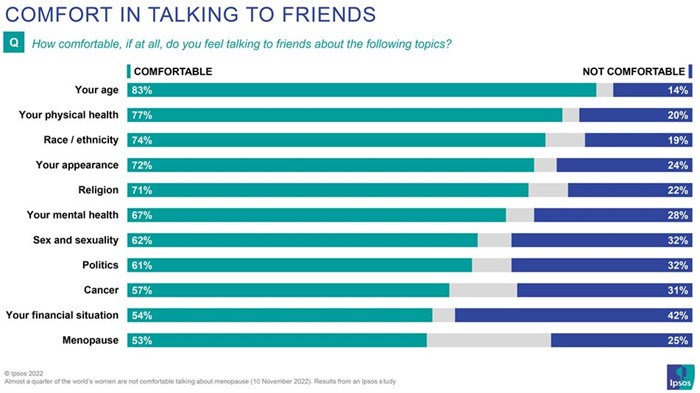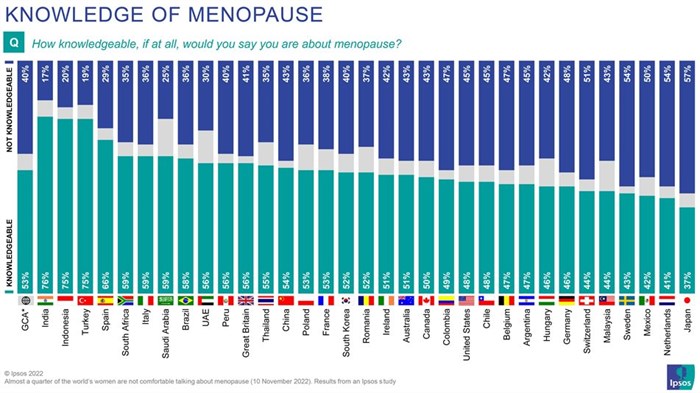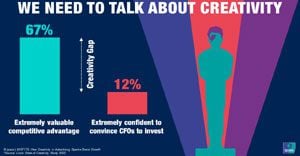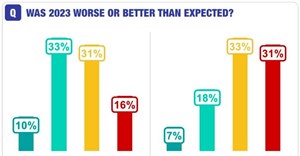
Almost a quarter of the world's women are not comfortable talking about menopause
How comfortable are we talking about menopause?
Ipsos’s 33-country survey of more than 23,000 adults show that around half of adults across the world are comfortable discussing menopause with friends (53% global country average). Leading the menopause discussions are Great Britain (65%), India (65%) and South Africa (63%). Countries that feel the least comfortable talking to friends about menopause is Hungary (22%), South Korea (39%), and Malaysia (40%). Whilst 64% of women are comfortable to talk about menopause, almost a quarter (23%) are not. Men are even less comfortable with this topic with just 43% feeling comfortable on average globally.
When comparing the 11 other topics of conversations measured, menopause is the least comfortable topic of conversation globally among those listed, with people feeling slightly more comfortable discussing their own financial situation (54%), cancer (57%) and politics (61%). In South Africa however, finances are the least talked about topic (49%), followed by menopause (63%) and mental health (69%).
Looking at this by gender in South Africa, it is no surprise that females are more comfortable talking to friends about menopause (77%) than men, while less than half of men share the same sentiment (48%). Asking South Africans which topics they feel more comfortable with, generally speaking, age (89%), race/ethnicity (87%) and religion (87%) trumps.

Knowledge of menopause
Hormonal changes related with menopause can affect physical, mental, emotional, and social well-being, with most women experiencing menopause between the ages of 45 and 55 years as a natural part of biological ageing. The symptoms experienced during and following the menopausal transition vary substantially from person to person. Some women have few if any symptoms, while for others symptoms can be severe and affect daily activities and quality of life with a possibility of experiencing symptoms for several years.
With menopausal impact on the lives of many, it is startling that only just over half of people around the world (53%) say they are knowledgeable about menopause. 40% of people indicate that they are not knowledgeable, including one in three women (30%) and almost half (49%) of men. Only 66% of women are knowledgeable about menopause despite it being something they can expect to experience in their lifetimes.
More than half of South Africans (59%) say they are very or fairly knowledgeable about menopause. This is six percentage points more than the 33-country average of 53%. Those who are not very or not at all knowledgeable about menopause make up 35% of South Africans.
With a higher knowledge base in South Africa than the global country average, it is no surprise that 73% of South African females are knowledgeable about menopause compared to an average of 66% of females globally. Men in South Africa (44%) also share a higher knowledge base than the global country average (40%).

People in India (76%), Indonesia (75%) and Turkey (75%) show the highest level of familiarity with menopause while Japan (37%), the Netherlands (41%) and Mexico (42%) are least likely to be knowledgeable on the subject.
The global population of postmenopausal women is growing. In 2011, women aged 50 and over accounted for 22% of all females globally. In 2021, this has increased to 26%1. Looking at South Africa, a similar trend can be seen with a 3 percentage point increase from 18% to 21%. Additionally, women are living longer globally.
Menopause can offer an important opportunity to reassess health and lifestyle, and with symptoms such as tiredness, hot flushes, lacking energy, headaches, difficulty in concentrating, irritability, difficulty sleeping/insomnia, muscle/joint pains, changes in mood and so forth, both women and men need to be better equipped to support women around menopause.
1 United Nations, Department of Economic and Social Affairs. (2021) World Prospects 2021 - https://population.un.org/wpp/
- Unlocking the value of creativity in advertising: How to bridge the creativity gap15 Apr 13:47
- 4 habits keeping your brand poor26 Mar 16:08
- Understanding consumer mindsets for growth in 202407 Mar 08:52
- South Africa's unemployment nightmare: The burden on its people09 May 10:05
- Global survey shows shrinking trust in internet29 Nov 10:17


















